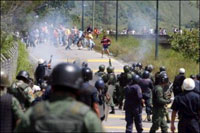Venezuela: Opposition to Chavez’s backed constitutional reform grows
The opposition to a constitutional reform that gives President Chavez the chance to become reelected indefinitely has grown in the last week, as Venezuelan prepare to either back or reject it in a referendum scheduled for December. Groups of students were fired on Wednesday, resulting in two gun-shot injuries, when they returned to campus after protesting the Government.

Seven more victims suffered other injuries, according to university official. Local television station Globovision broadcast images of protesters running for cover during the incident on the campus of the Universidad Central de Venezuela. One image showed a man in a black leather jacket firing a pistol twice. Interior Minister Pedro Carreno said at 7:10 p.m. New York time that the situation was under control.
But problems for Chavez’s reform, the second in less than ten years in presidency, are not also coming from students and opposition parties. His former Minister of Defense and leader of the military group that reinstated him in power during the 2002 coup, Gen. Raul Baduel, and his former vice-president, José Vicente Rangel, rejected the unlimited reelection of Chavez.
Gen. Baduel said that the reform meant a “coup d’etat” and his comments were silently backed by a portion of the army that is not ready to support Chavez’s attempt to keep power forever. Rangel is also now a critic of Chavez’s methods and asked the opposition to go to the polls to reject the proposal. The opposition is split in those who are ready to vote for the negative and those who stand for the abstention.
The changes would include eliminating presidential term limits, easing the seizure private property and reducing the powers of state governments. Baduel warned the reforms would "seize power away from the people," and urged citizens — and soldiers — to study them carefully.
Chavez said Baduel “betrayed” him. “He is a pawn of those who want violence in the streets of Caracas”, the President said after leading a 1.5 million people demonstration in the country’s Capital on Sunday.
All along the week, tens of thousands of students marched across downtown Caracas to the Supreme Court building to petition for a delay to a referendum Dec. 2. ``I'd like to make a call for reflection,'' Carreno said in a national address. ``We are making a call to the owners of the mass media, to the students, to the leaders of the opposition political parties -- enough already.''
Students, business groups, the Catholic Church and some of Chavez's former allies have come out against the constitutional plan during the past two weeks. Protests at the Universidad de Lara, in Lara state, on Nov. 2 turned violent, resulting in two deaths by gunshot.
Despite opposotion claims, Chavez insists the reforms would not boost his power but rather help democracy flourish by empowering neighborhood assemblies, creating new types of collective property and easing his planned transition to socialism.
Hernan Etchaleco
Subscribe to Pravda.Ru Telegram channel, Facebook, RSS!


